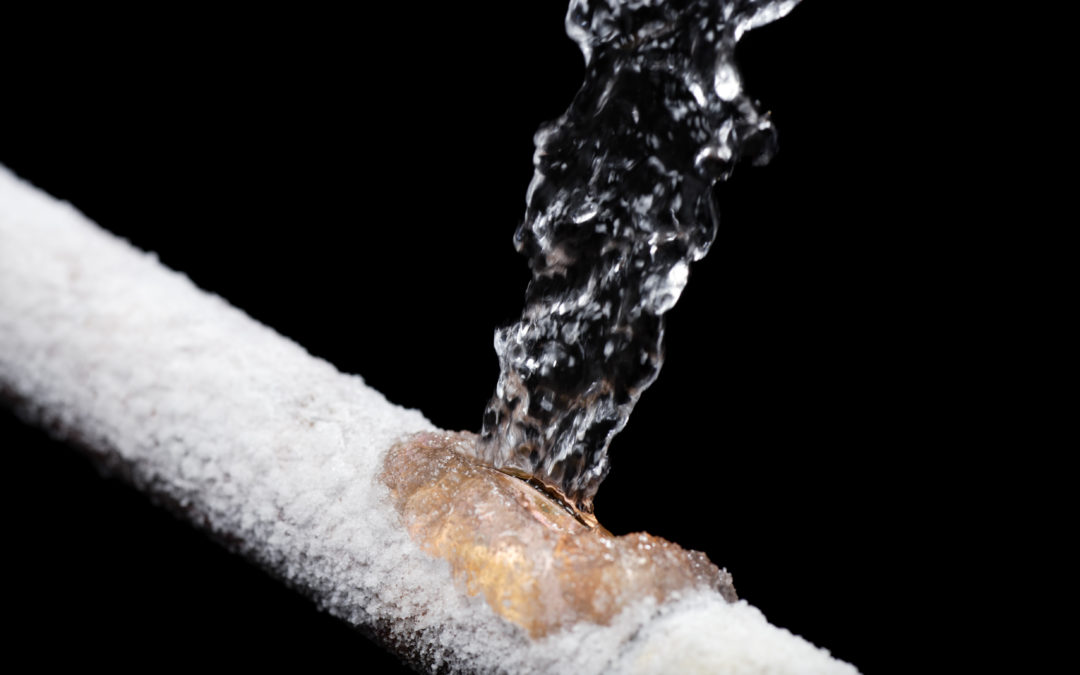You can feel it – that cold chill in the air that gives you nostalgic flashbacks to cheerful holidays…or to the stress of frozen and burst pipes.
If you’ve been through that type of disaster, you know what we’re talking about…and you’ll never think about winter the same!
Frozen pipes are the most common emergency during the winter season and the damage they can cause is impressive (but not in a good way, trust us!).
The good news is that there are very simple steps you can take today to proactively protect your property (and sanity) this winter.
So what are frozen pipes?
When temperatures are cold enough, it can create ice within the pipe. Water expands as it freezes, putting extra pressure and force on the pipe itself. Many times, the issue occurs in an external pipe (think hose lines, exposed pipes in parking garages, etc.) or in a poorly heated internal space (like attics).
Contrary to popular belief, pipes don’t actually burst where the ice has formed. Instead, they tend to burst further downstream where the pressure from the ice blockage has accumulated.
Pipes can also burst as the temperatures start to rise and the ice starts to thaw. If you have several days of frigid temps, followed by a mild day or two, the situation is ripe for pipes to burst.
What happens when a pipe bursts?
Depending on the pipe and supply of water, a burst pipe can cause significant damage very quickly.
Every second, 9 liters of water flow through a pipe that is 10 centimeters in diameter (on average). So picture 4, 2-liter bottles of soda pouring onto your floor EVERY SECOND. Now imagine the damage in just a few minutes – or however long it takes for you to shut the water off.
By that point, you may have water spilling through several units or floors of your building. Ceilings. Walls. Flooring. Furniture. Everything – soaked.
Furthermore, a burst pipe can cause mold issues if it isn’t mitigated properly!
This doesn’t sound good – how can I prevent it?
- Keep it flowing. Keeping a small flow of water running through your pipes when the temperatures drop can keep them from bursting. Allowing faucets to run won’t actually prevent freezing in the pipes, but it will reduce the risk of it bursting. Only pipes that are vulnerable to freezing (those in unprotected spaces or without insulation) should be left to run and at a very slow drip because you want to save as much water as possible.
- Make a plan for travel. Lots of people lower their heat during times when they won’t be home to save money on energy. However, be careful how low you put the temperature when you’re traveling. Keep your home or building at a minimum of 55 degrees. And if do you lower the thermostat, leaving cabinets where lines are run open to allow the heated air in.
- Inspect and insulate. Making sure your pipes stay warm enough not to freeze might seem simple, but it isn’t always that straightforward. First, inspect your pipes for weakness or damage then make a plan to protect them. Sometimes you’re left with pipes that aren’t in ideal locations and are susceptible to the elements, so you’ll need to insulate them. Pipes in precarious places can be wrapped with insulation to slow the transfer of heat and protect from the cold.
- Heat it. If you have a frozen pipe, use a heating pad or personal space heater to heat up a section of the pipe. Continue to apply heat until full water pressure returns. Do not leave heat unattended. Leaving the heating sources unattended is a risk of fire, so stay with your thawing pipe until it is totally thawed.
What happens if a pipe bursts on my property?
If, despite your best efforts, you experience a burst pipe, be sure to act quickly. Turn the water supply off as quickly as possible. Start the water extraction process as quickly as you can to prevent the damage from spreading. And, of course, call your plumber ASAP to fix the issue.
Call a certified restoration company to help you extract, dry and mitigate the damage. You may want to file an insurance claim to help pay for the water damage and any repairs that may be needed. Keep in mind that extensive demolition may be needed depending on how much water there was.
SecureCore is here to help!
If you need emergency services due to a burst pipe, call us at 866-498-4038. We have a team of trusted restoration partners across the country who can respond 24 hours a day, 7 days a week, 365 days a year.
We are your partner before, during and after emergencies!

